|
|
|
Sort Order |
|
|
|
Items / Page
|
|
|
|
|
|
|
| Srl | Item |
| 1 |
ID:
148787
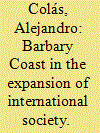

|
|
|
|
|
| Summary/Abstract |
From the ‘long’ sixteenth century the Ottoman regencies of North Africa operated as major centres of piracy and privateering across the Mediterranean Sea. Though deemed by emerging European powers to be an expression of the ‘barbarian’ status of Muslim and Ottoman rulers and peoples, piracy, and corsairing in fact played a major role in the development of the ‘primary’ or ‘master’ institutions of international society such as sovereignty, war, or international law. Far from representing a ‘barbarian’ challenge to the European ‘standard of civilization’, piracy and privateering in the modern Mediterranean acted as contradictory vehicles in the affirmation of that very standard.
|
|
|
|
|
|
|
|
|
|
|
|
|
|
|
|
| 2 |
ID:
150998
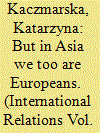

|
|
|
|
|
| Summary/Abstract |
The standard of civilisation served Western states to hierarchically organise international politics and reproduce Western pre-eminence. Russia, depending on the historical period, has been interpreted as either an ardent follower or a major challenger to Western projects, but it has been markedly absent from debates regarding the standard. This article proposes to engage Russia in the standard of civilisation discussion with reference to the standard’s two most considered expositions: the colonial-era ‘original’ and what the literature interprets as the standard’s contemporary revival. In order to do so, I trace Russia’s nineteenth-century colonial practices and analyse Russia’s selected policies towards post-Soviet states in the post–Cold War period. On the basis of these explorations, I argue that Russia’s application of the standard of civilisation goes beyond the mere reproduction of hierarchical arrangements between an imagined centre and peripheries. The practices of the standard of civilisation have been employed to improve Russia’s desired, and imagined, status in international politics – that of a great power equal to the West. From that it follows that the concept of the standard of civilisation should be recognised as ordering relations not only of the strong and the weak but also of those in position of power in international politics.
|
|
|
|
|
|
|
|
|
|
|
|
|
|
|
|
| 3 |
ID:
176500
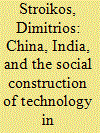

|
|
|
|
|
| Summary/Abstract |
In recent years, there has been a growing scholarly interest in how International Relations theory can contribute to our understanding of the impact of technology on global politics, underpinned mainly by an engagement with Science and Technology Studies (STS). However, less attention has been paid to the ways in which international society shapes technology. Building on sociological and historical studies of science and technology, this article outlines one way through which international society has constituted technology by developing a synthetic account of the emergence of technological advancement as a ‘standard of civilisation’ in the nineteenth century that differentiated the ‘society of civilised states’ from non-European societies, with a particular focus on China and India. In doing so, this article also highlights how this process has had a powerful and enduring influence on Chinese and Indian conceptions about science and technology. Thus, by shifting the focus from how technology shapes global politics to how international society shapes technology, this article provides new insights into the relationship between technology, power, and modernity in an interdisciplinary context. It also offers a new way of thinking about the complex dynamics of today's global politics of technology.
|
|
|
|
|
|
|
|
|
|
|
|
|
|
|
|
| 4 |
ID:
162492
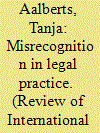

|
|
|
|
|
| Summary/Abstract |
This article discusses the concept of misrecognition to analyse international legal ordering in the practice of colonial treatymaking. As critical interventions to the debate on recognition have made clear, recognition is about exclusion as much as it is about inclusion. The most obvious example is the nineteenth-century applications of the standard of civilisation, where the European Family of Nations introduced the criterion of ‘civilisation’, which excluded non-European entities as sovereigns and legitimised their colonisation. But at the same time colonial treaties included the ‘savage rulers’ as signatory powers, and thus legal persons within the international legal order that at once excluded them. This contribution to the Special Issue discusses these treatymaking practices as a practice of misrecognition; not because it misrecognises some natural, essential, or true identity of the indigenous entities, but as a misrecognition of the international order’s own conditions of possibility through practices that simultaneously constitute that order and undermine its constitutive conditions. A rereading of Hegel’s famous master–slave metaphor through the concept of misrecognition sheds light on the reversals and contradictions of the colonial legal enterprise and reveals the aporia of the contemporary international legal order by showing the void at its heart.
|
|
|
|
|
|
|
|
|
|
|
|
|
|
|
|
| 5 |
ID:
184045
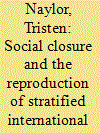

|
|
|
|
|
| Summary/Abstract |
This article investigates how the means by which actors compete for position in the management of international society stratifies international order. Advancing scholarship on hierarchies, it applies a theory of social closure to examine two status groups, The Family of Civilised Nations and the G20, arguing that stratification is reproduced by a dynamic interplay of top-down collectivist exclusion on the part of superiorly positioned actors and bottom-up mimicry performed by those inferiorly positioned. As such, the same means of closure which used the Standard of Civilisation to exclude outsiders from the Family of Civilised Nations in the past stratifies non-state actors today, particularly international non-governmental organisations (INGOs) seeking to play a role in-the G20. This article offers amendments to closure theory in International Relations (IR), demonstrating its utility for analysing contemporary international politics, engaging in trans-historical analysis, and in incorporating non-state actors into enquiry.
|
|
|
|
|
|
|
|
|
|
|
|
|
|
|
|
|
|
|
|
|